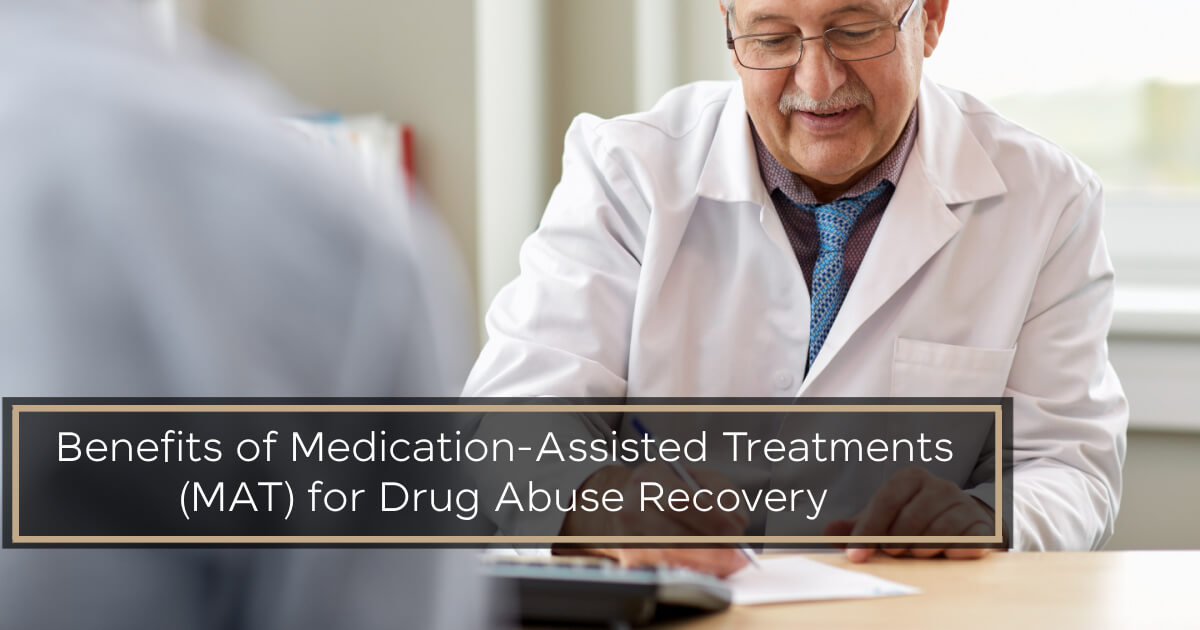Drug abuse recovery involves various treatment methods, each with its own benefits and challenges. One effective method is Medication-Assisted Treatment (MAT), which combines medication with counseling and behavioral therapies. Learning more about this process may help you decide if medication-assisted treatment is the right choice for your addiction recovery.
What is Medication-Assisted Treatment (MAT)?
The question “What is Medication-Assisted Treatment?” often arises in discussions about treatment for opioid use disorder. Medication-Assisted Treatment (MAT) uses medications along with counseling and behavioral therapies to help treat substance use disorders.
This type of inpatient treatment is often used for opioid addiction, as MAT is thought to help manage withdrawal symptoms and reduce cravings to make the recovery process more manageable. MAT commonly provides a more holistic approach to drug abuse recovery. It’s often an effective method for those seeking recovery from drug abuse.
Pros and Cons of Medication-Assisted Treatment
MAT offers several advantages compared to other drug abuse recovery options. Of course, it also has a number of drawbacks. Weighing all your options may help you decide if a medication-assisted treatment program is the right choice for you.
Pros
Effective in Reducing Relapse
Evidence-based treatment for opioid use disorder shows that MAT may significantly lower the chances of relapse.
Improves Retention in Treatment
Patients are often more likely to stay engaged in their addiction recovery care when using MAT.
Improves Overall Recovery
Combining medications with therapy addresses both the physical and psychological aspects of addiction.
Cons
Potential for Misuse
Medications that are commonly used to treat opioid addiction may be misused, leading to new dependencies. An addiction treatment plan needs to be in place in order to limit the chance of this happening.
Access and Cost Issues
Not all inpatient treatment centers offer MAT, and it can be expensive. Comparing all your options may help you find a more affordable option for inpatient treatment and addiction recovery.
Social Stigma
There remains a stigma for using medications for addiction recovery, which may discourage patients from seeking this treatment. Discussing the benefits of drug abuse recovery with a medical professional can be key to dispelling such stigmas.
Here are some of the primary reasons that medication used for opioid addiction is often the right choice.
Safer Withdrawal Experience
Withdrawal from opioids can be incredibly challenging and dangerous. MAT often plays a crucial role when attempting to create a safer withdrawal experience. Medications may help manage withdrawal symptoms, reducing the risk of complications. Easing these symptoms is thought to allow patients to focus on their recovery from drug abuse without the constant battle against intense cravings and the discomfort that is often experienced during this process.
Reduces Rate of Relapse
One of the biggest benefits of using medication-assisted treatment for opioid use disorder is its ability to reduce relapse rates. The medications used in MAT may help to stabilize brain chemistry, limit the effects of opioids, and relieve cravings. Stability is crucial for maintaining long-term sobriety and achieving successful drug abuse recovery.
Potential for Misuse or Development of New Addiction
Despite its benefits, MAT is not without risks. The potential for misuse of medications that are intended to treat opioid addiction exists, which can lead to the development of a new dependency. It’s essential to have addiction medication management strategies in place to mitigate these risks. Healthcare providers must carefully monitor patients to ensure that the medications are used as prescribed and adjust the addiction treatment plan as needed.
Closing Thoughts About Addiction Recovery Care
Medication-Assisted Treatment (MAT) offers an effective approach to drug abuse recovery. MAT is thought to help to address both the physical and psychological aspects of addiction by combining medications with counseling and behavioral therapies. While there are pros and cons of medication-assisted treatment, the benefits often outweigh the drawbacks, making it a valuable option in addiction recovery care.
Safer withdrawal experiences, reduced relapse rates, and overall improved patient outcomes highlight the importance of MAT when treating some drug use disorders. Careful management is extremely important in order to prevent potential misuse of such medications. As part of a well-rounded addiction treatment plan, MAT may help improve the chances of successful recovery from drug abuse.








